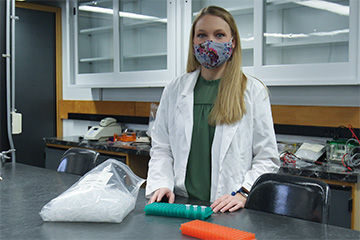
03/07/2022
Students and faculty from SUNY Cortland’s Biological Sciences Department will join a team from Cornell University on an animal science research project that aims to better understand the maternal adaptations that promote lactation in mammals.
The work also will provide insight to how improving the efficiency of food production may ensure food security, while reducing environmental impact.
A $1 million grant from the National Science Foundation (NSF) will help fund full-time summer research experience for two SUNY Cortland undergraduates annually for the next four years. Assistant Professor Amanda Davis will help lead the project as a co-principal investigator.
The work will use sheep to test whether ceramide, a type of lipid, drives milk production in mammals by promoting a process called insulin resistance. This work is important because increases in insulin resistance can make milk production more efficient and environmentally sustainable, building on previous knowledge about nutrient use in cows.
Enhancing milk production efficiency reduces the need for cattle, land, water and fossil fuels, generates less greenhouse gases, and favors a smaller carbon footprint.
“We’re seeing global population growth, and we need to have enough food to feed everyone,” said Davis, who earned a Ph.D. in animal physiology from Cornell. “On top of that, there’s this issue of climate change, so we have to be creative about how we improve the efficiency of food production.
“That’s the larger idea here: improving the efficiency of nutrient use in animals to maximize what they’re producing so we can feed everyone and solve these problems.”
Davis explained that, during milk production, there’s a way to redirect the nutrients that cows store to the milk itself. The researchers believe ceramide plays a key role in this process and they will use a flock of pregnant sheep at Cornell to better understand lactation in the animals.
Two SUNY Cortland students each summer will be selected for the Research Experiences for Undergraduates (REU) portion of the NSF grant. Their eight-week experience will involve hands-on work with the sheep at Cornell — from feeding and milking to blood sampling and tissue collection. They also will learn an advanced procedure to assess insulin sensitivity, or how well the sheep utilize glucose.
In addition to receiving free summer housing on SUNY Cortland’s campus, students will use Bowers Hall laboratories to run blood sample tests and gather additional data for the research project.
Students do not need to have a background in animal science to pursue the experience, Davis said. The project is physiology-based and can provide foundational knowledge for many science-related professions, including the medical field.
“Students will get the start-to-finish experience of what it’s like to actually carry out an experiment, make data their own, analyze it and present it,” Davis said, noting that student researchers will be selected this spring with a focus to recruit underrepresented populations in science fields.
Davis understands the value of early research experience because it was pivotal to her own career path and her work with Joseph McFadden, the project’s principal investigator and an associate professor of dairy cattle biology at Cornell.
As an undergraduate at West Virginia Wesleyan College, Davis pursued a summer research opportunity at West Virginia University, where she first connected with McFadden. Davis worked in McFadden’s laboratory as a graduate student at West Virginia University, then followed him to Cornell for her doctoral degree.
“The idea is that, at the end, students can attach their name to this project and say: ‘This is what I did,’” Davis said.
In addition to the project’s research component, the NSF grant will aim to develop communication skills in undergraduates, especially when they discuss their research with people who do not possess a deep knowledge of science.
“Our goal is to first educate our undergraduates on the broad implications of this work because many of them likely don’t have an animal science background,” Davis said. “By the end of the experience, our students will have the skills to communicate their work to a more general audience.”
That’s why the summer experience will include communication training that introduces scientific journals and background research as well as career planning workshops on how to put together a curriculum vitae, or an academic résumé.
The research team also has plans to lead interactive activities at the Sciencenter, the hands-on museum in Ithaca, and eventually showcase the full four years of its work at the New York State Fair in Syracuse.
“It’s so important to teach scientists how to break down their complex work in ways that are understandable and engaging to the public,” Davis said.